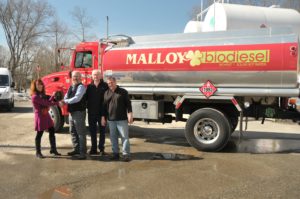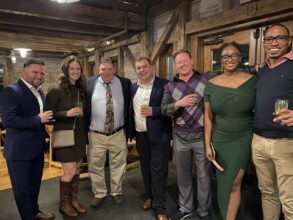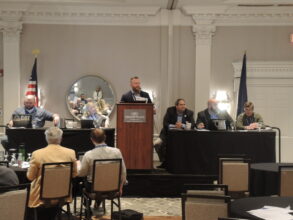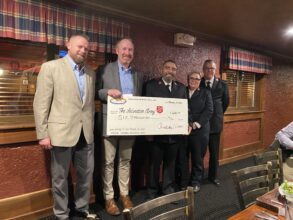Making Inroads in the Biodiesel Market
T.H. Malloy & Sons and Black Bear Biodiesel are fueling changes in diesel fueling and home heating, reports Maura Keller, contributing writer for Fuel Oil News. Here is Keller’s feature article, from the December 2017 issue of Fuel Oil News:
For many people, the idea of having a family business to join might sound like a walk in the park—the chance to create your own position, lifetime job security, and dear old dad as your boss.
T.H. Malloy & Sons, a full-service home heating, motor, marine and diesel fuel provider, is a family-owned entity that has made a mark on the fuel industry in Rhode Island and southern Massachusetts.
For Jim Malloy, the third-generation overseer of Malloy Biodiesel and founder and managing partner of Black Bear Biodiesel, following in the steps of his father and grandfather may not qualify as a walk in the park, exactly, but it offers a wealth of opportunities and challenges, including continuing the family legacy.
“In 2005, I introduced my wife, Erin Malloy’s idea of utilizing the family’s existing infrastructure to address the need to have a lower emission, American-made, regionally produced fuel,” Jim Malloy says. “We have been a strong proponent of biodiesel for the past 13 years. We use it in our own fleets, homes and our business.”
The Malloy’s first gravitated towards biodiesel due to the family’s desire to buy American first. And because they had a keen understanding that Rhode Island has high asthma rates due to particulates in the air, the Malloy family wanted to be a part of the solution.
In 2007, after a couple of years using and distributing biodiesel, the company partnered with Newport Biodiesel. “We appreciated the values and work ethic of this business as they recycled waste vegetable oil across the region and produced the highest quality fuel,” Malloy says. “We have had a decade of our businesses mutually benefitting from one another.”
Jim Malloy and Robert Morton, co-founder and chairman of the board of Newport Biodiesel, have joined forces. Uniting the companies’ efforts locally, they also successfully lobbied for legislation in Rhode Island that exempts all biodiesel created within the state from the 32-cents per gallon motor fuel excise tax.
“On the federal level, we have had our voices heard on Capital Hill in Washington, D.C., in regard to the expansion of the renewable fuel standard and the biodiesel tax credit,” Malloy says.
Through his business acumen and legislative efforts, Jim Malloy has made an impact on the biodiesel market by founding Black Bear Biodiesel. Based in Plainfield, Vt., Black Bear Biodiesel is a used-cooking oil recycler and biodiesel retailer. Sourced only from waste cooking oil, Black Bear Biodiesel meets strict ASTM standards to ensure quality and safety, and is approved by the U.S. Department of Transportation as an alternative fuel source. In 2016, Black Bear Biodiesel collected approximately 100,000 gallons of used oil for processing.
“We work closely with our partners, Newport Biodiesel and T.H. Malloy, in production and distribution,” Malloy says.
Built to a scale that fits the rural, picturesque landscape of northern New England, Black Bear Biodiesel first and foremost partners with Newport Biodiesel in processing and distribution. The company also has a strong ally in a used cooking oil program with Maine Standard Biodiesel in Portland, Me. Black Bear Biodiesel partners with restaurant customers to offer a free option to recycle their used cooking oil and then up-cycle for high quality fuel and a greater good.
This creates a closed loop cycle in which Black Bear Biodiesel is recycling a local waste product and offering it back to the community as an affordable sustainable fuel source. This model has a direct positive impact on both the global environment and the local economy. The Plainfield facility will also be home to local food truck vendors, Jim Malloy says, and is a gathering spot for the community.
THE FAMILY BUSINESS is a vital force in the American economy. About 90% of all U.S. businesses are family owned or controlled. They range in size from the traditional small business to Fortune 500 firms. According to the Small Business Administration, it is estimated that family businesses generate about half of the country’s gross national product and half of the total wages paid.
“Our family business was started in 1935 by our grandparents, Thomas Henry Malloy and Mae Malloy,” says Jim Malloy. “Thomas Henry was the face and brawn, while Mae Malloy ran the behind-the-scene business from the kitchen table of their house.”
At that time, the business delivered home heating fuel and had a kerosene pump at their current location in Cumberland, R.I. Jim Malloy’s father, Thomas Joseph Malloy, started working in the business after graduating from high school at age 16. He, along with his wife, Joan Malloy, expanded the business to become a full-service home heating company. For decades Thomas Joseph helped grow the company and make a mark on the industry—a mark that earned him a posthumous induction into the New England Hall of Fame in June 2017.
The 1980s introduced the third generation to the family’s evolving business with the addition of Thomas James Malloy, who expanded the company’s product and service line to include on- and off-road fuel, distribution to fleets, and propane.
Mid-sized family companies are often kept intact by a sense of family legacy, a sense that the family heritage has an intrinsic worth of its own. And many of these companies are defined by the old-time practice of a founder naming a company after themselves; names that still mark the founders’ descendants generations later. And while Black Bear Biodiesel doesn’t boast Jim Malloy’s name, it does exude his passion for “all things biodiesel” and his determination to offer customers a clean-burning renewable alternative to petroleum diesel.
“Through the years we have been faced with the challenges of a changing economy and fluctuating markets. However, through it all we have adapted to fulfill our customers’ needs,” Malloy says. “The fuel business has made us an integral role in the community. We enjoy our community role in keeping families warm and businesses running. We are proud to be important members of our community. Our family has been on a slow, steady upward trajectory over the past 82 years so we will continue to progress in this fashion.”
What does the future hold for the new emerging industry of biodiesel from recycled cooking oil? Evidence indicates that biodiesel will likely be part of a portfolio of solutions to high-energy prices, including conservation, more efficient energy use, and use of other alternative fuels. In addition, to help further the commercialization of biodiesel fuels, education of policy makers, corporations, city and county governments and the public is critical.
As Malloy explains, the biodiesel industry has been growing for the past decade and has the capacity for continued growth and success.
“The biodiesel industry has a myriad of models and scales across this nation,” Malloy says. “The future is bright for biodiesel because the fuel is cleaner burning, utilizes existing infrastructure, requires zero modifications to fulfill heating or transportation needs, and it can be produced regionally without the need for pipelines, to help strengthen local economies.”
Pictured, from left: Wendy Lucht, Ocean State Clean Cities Coordinator; Jim Malloy, Ocean State Clean Cities board, founder of Black Bear Biodiesel, and managing partner of T.H. Malloy & Sons; Tom Malloy Sr., who was president of T.H. Malloy until his death earlier this year; and Tom Malloy Jr., president of T.H. Malloy. Photo courtesy of T.H. Malloy & Sons.




